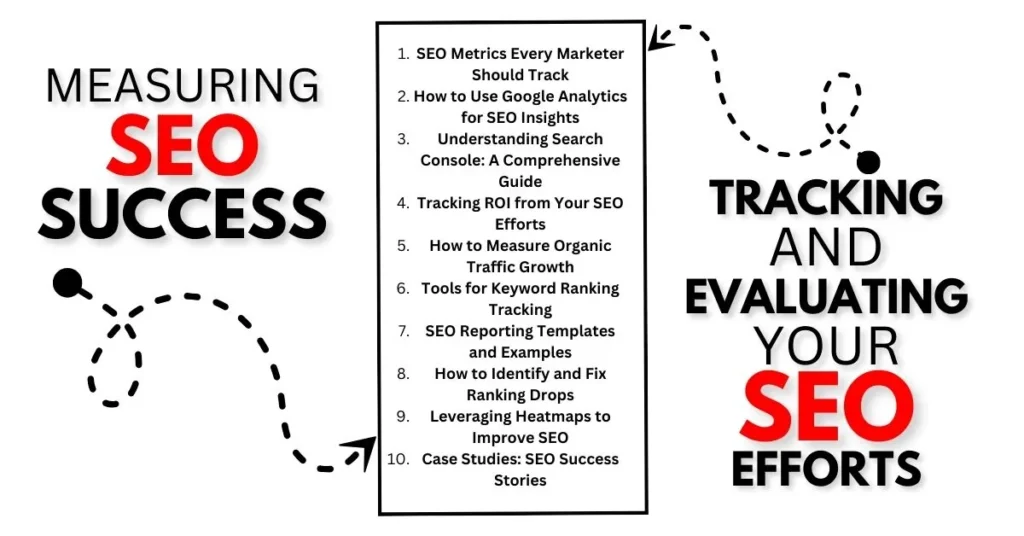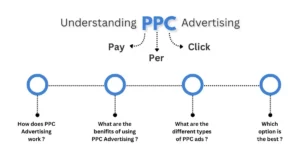
SEO (Search Engine Optimization) is a complex field that requires performance measurement. This allows you to determine both effective strategies and unprofitable areas for improvement. What are the effective methods of Evaluating SEO achievement? What metrics should you track? Which tools would be best suited for acquiring important data on your SEO performance?
Table of Content
- 1 SEO Metrics Every Marketer Should Track
- 2 How to Use Google Analytics for SEO Insights
- 3 Understanding Search Console: A Comprehensive Guide
- 4 Tracking ROI from Your SEO Efforts
- 5 How to Measure Organic Traffic Growth
- 6 Tools for Keyword Ranking Tracking
- 7 SEO Reporting Templates and Examples
- 8 How to Identify and Fix Ranking Drops
- 9 Leveraging Heatmaps to Improve SEO
- 10 Case Studies: SEO Success Stories
- 11 Conclusion
SEO Metrics Every Marketer Should Track
Evaluating SEO success correctly organizations should determine their most essential key performance indicators (KPIs). Working with these specific metrics gives you crucial information about your SEO strategy success rates so you can determine goal achievement.
Here are the most important SEO metrics you should track:
Organic Traffic
The number of visitors searching for your site through search engines without clicking any paid advertisements constitutes organic traffic. The search engine results page ranking and visitor count from search engine referrals represent the essential measurement for determining SEO success.
Keyword Rankings
The procedure of monitoring keyword positions serves to reveal how your selected search phrases perform in the search engine results. The tool enables you to check if your pages advance or decline in search results so you can determine if your content or SEO approach needs optimization.
Click-Through Rate (CTR)
The Click-Through Rate helps determine how many people will tap your website following a search engine result display. The percentage of searchers who click after viewing results indicates that your title tag and meta description, along with content interest, match your target audience’s needs.

Bounce Rate
When visitors arrive at your webpage and immediately leave before any interaction your site receives the status of bounce rate. Your landing page becomes problematic when visitor bounce rates exceed 70% because it may fail to connect with their search needs.
Conversion Rate
Website effectiveness in converting website visitors to new customers stands as a measure called conversion rate. Your SEO’s financial business worth relies heavily on this metric, which tracks the number of customers acquired from your website.
Page Load Time
The duration it takes pages to load relates to how users experience web pages and which positions they receive in search engine rankings. Websites that load quickly earn better search engine rankings, while users tend to leave websites that take too long to load.
Backlinks
The quantity, along with the nature of websites linking back to your site, plays an important role as a metric. As search engines perceive backlinks from reputable sources they determine your content to be authoritative and applicable.
Page-Level SEO Metrics
Each page needs evaluation for its SEO performance. The page ranking performance depends heavily on several elements, including on-page keyword frequency, content length, and image optimization, together with the internal linking structure.
How to Use Google Analytics for SEO Insights
For evaluating SEO achievements, Google Analytics ranks among the most robust in the market. The understanding of Google Analytics’ basic features enables users to extract actionable insights about organic traffic performance along with user behaviour and additional data.
Traffic Acquisition
The “Acquisition” section lets you monitor visitor paths to your website, especially for organic search traffic. The “Acquisition” section displays which keywords or pages direct the most website visitors.
Behavior Flow
The tracking of user movements through your site occurs in the “Behavior” section. Studying user behaviour flows helps you understand which points users leave your site and which points they engage the most, which enables you to improve your site structure.
Landing Pages Report
Organic traffic data about landing pages surfaces in Google Analytics through its “Landing Pages” report. The report helps identify leading pages and valuable content that require SEO enhancement.
Goal Tracking
Google Analytics allows users to establish “Goals” for tracking website conversions, including form submissions alongside purchases or various other website behaviors. Goals implemented in Google Analytics provide measurement capability for tracking precise SEO effects on business performance.
Understanding Search Console: A Comprehensive Guide
Google Search Console functions as a vital measurement tool for SEO practices. GSC delivers a complete understanding of Googlebot’s interactions with websites in addition to revealing a site’s presentation within Google search results.

Performance Report
You can find essential organic search performance metrics including clicks and impressions alongside click-through-rate and average position in the Performance report of Search Console. This information supports developers to grasp which search queries result in user visits along with their rank positions.
Index Coverage
Search Console displays an “Index Coverage” report, which identifies both indexed pages and their respective indexing problems.
URL Inspection Tool
Through the URL Inspection Tool, you can monitor the present status of specific URLs stored by Google in their index. The tool reveals whether Google can properly discover and index particular web pages.
Core Web Vitals
Google’s search console utilizes Core Web Vitals to evaluate the factors that influence user experience by measuring the speed of page loading and interactivity, in addition to visual stability. The capability to rank successfully heavily depends on these measurements.
Tracking ROI from Your SEO Efforts
SEO effectiveness depends heavily on ROI (Return on Investment) measurement because this metric reveals the results of your optimization investments. Evaluating SEO ROI starts by determining the total worth of SEO-related costs alongside the revenue obtained through organic search visitors.
Revenue from Organic Traffic
Measure organic visitor revenue using Google Analytics as your tool. E-commerce tracking features in Google Analytics should be set up to track purchases as well as calculate average order value and conversion ratios.
Lead Generation
For service-based businesses, track lead form submissions, phone calls, or sign-ups as conversions. You can determine the ROI for SEO lead generation through lead cost assessments that support the calculation of the ROI based on earned leads.
Cost of SEO
Evaluating SEO ROI, corporate entities need to combine costs from SEO tools with the expenditures of content production and external link procurement costs. To measure profitability you should compare both costs and revenue systems along with lead value.
How to Measure Organic Traffic Growth
The natural expansion of website traffic depends directly on achieving successful SEO rankings from organic search engine results. Here’s how to measure it:
Track Traffic Trends Over Time
The tools in Google Analytics enable users to track changes in organic traffic during a specific timespan. Have a close look at seasonal patterns and traffic growth patterns as well as the relationship between your SEO adjustments and traffic levels.
Segment Traffic by Source
Your examination of organic traffic will be enhanced when you divide it into segments based on keywords, devices and locations to see detailed changes.
Monitor Landing Pages
You should track down which landing pages generate organic visitors. Tracking landing pages allows you to find out which pages effectively use SEO optimization while identifying those needing further optimization.
Tools for Keyword Ranking Tracking
The process of following your keyword placement requires ultimate priority because it helps you assess your SEO approach effectiveness. Popular tools exist for monitoring your keyword rankings as follows:
Ahrefs
The keyword tracking tool available in Ahrefs displays both your target keywords’ search rankings and their respective brings of organic traffic.
SEMrush
Through SEMrush, users gain precise keyword rank information that includes competitive benchmarking data about their search ranking position relative to competitors.

Moz
Moz’s keyword tracking tool enables you to monitor keyword positions throughout periods to assess your domain and page authority, plus the site’s general SEO condition.
Google Search Console
Google Search Console provides keyword ranking data, but it contains less information than what paid tools can deliver. The tool offers ongoing value as a free option to monitor the searches that deliver the best results.
SEO Reporting Templates and Examples
An excellent SEO report needs to provide readers with a brief yet comprehensive presentation of fundamental metrics and performance indicators. These are the essential components which should form part of an SEO report:
- Traffic Data: Organic traffic performance over time.
- Keyword Performance: The system tracks target keyword performance measurement.
- On-Page SEO: Updates on keyword optimization, content improvements, and meta tags.
- Backlink Evaluation: The quantity and authority of inbound links.
- Conversions and ROI: The documentation includes conversion metrics together with the contribution of SEO efforts to achieve business targets.
Available within tools like Ahrefs along with SEMrush and Google Data Studio you can create these reports through templates.
How to Identify and Fix Ranking Drops
Ranking drops need immediate investigation followed by necessary corrective steps when they occur.
Use Google Search Console
You should review the “Performance” report to watch for dramatic changes in the number of impressions and clicks as well as keyword position shifts. Examine major updates and penalties that Google has issued through their algorithm.
Check for Technical Issues
Problems related to SEO technology which lead to slow response times and broken website elements or crawl issues, will degrade your rankings. View technical problems in your site through Screaming Frog or Sitebulb then implement solutions to resolve those issues.
Analyze Content Quality
Subpar content quality, together with outdated material, tends to result in search engine rankings declining. Your content needs both freshening up and new information, along with advanced keyword optimization.
Competitor Analysis
Check competitive analysis tools to identify if your rivals have gained substantial SEO strength and determine their lead over your web pages in specified areas.
Leveraging Heatmaps to Improve SEO
The visual presentation of visitor interaction data with your site comes through heatmaps. Tracking user behavior reveals which page sections receive the most focus and determines the parts that cause users to become stuck or abandon the page.

Tools for Heatmaps
Hotjar and Crazy Egg represent popular heatmap tools that offer visual mapping for website user clicks along with scroll movements and mouse pointer movements. The collected insights will help optimize user experience while establishing SEO page improvements.
Case Studies: SEO Success Stories
Real-world examples provide the best means to comprehend SEO functioning. Organizations across the board use wise SEO strategies to elevate their standing in search results and draw in more visitors. For instance:
- Case Study 1: The New York Times Organic traffic alongside click-through rate touched new heights at The New York Times after the company upgraded the site’s technical SEO and featured snippet optimization functions.
- Case Study 2: Patagonia enhanced its business growth through efficient blog optimization, valuable keyword selection and superior user platform delivery, which boosted organic traffic and sales performance.
Conclusion
Evaluating SEO success assessment demands an ongoing sequence that involves performance tracking by key metrics while analyzing data and constantly improving your strategy. You can guarantee your SEO results through consistent progress evaluations using proper tools and major SEO metric measurements. The guide you have now gives you the tools necessary to achieve long-term SEO performance growth and achieve sustainable success.
Featured Blogs

SEO Fundamentals 2025: A Step-by-Step Guide for Beginners
Businesses, brands, and individual seekers rely on maintaining strong digital visibility in the present digital world. SEOs provide optimization solutions...

PPC Guide: Everything You Must Know
Pay-per-click (PPC) advertising proves itself as the top approach within digital marketing to deliver precise traffic while simultaneously boosting brand...
Adeel Akram
Adeel Akram – SEO Expert & Digital Marketing Strategist Adeel Akram is a results-driven SEO specialist and digital marketing strategist with a passion for helping businesses increase organic traffic, improve search rankings, and drive conversions. With 5 years of experience in on-page SEO, technical SEO, and link-building, Adeel stays ahead of the latest Google algorithm updates and industry trends. As a contributor to DigiPro, Adeel shares expert insights, proven strategies, and in-depth guides on SEO, content marketing, and digital growth. Whether it's optimizing websites for better visibility or crafting high-converting content, Adeel is dedicated to empowering businesses with actionable SEO knowledge. 📢 Follow Adeel Akram for the latest SEO trends & strategies!
 Limited Spots Available! Apply Now!
Limited Spots Available! Apply Now!  Experience top-quality learning before you commit!
Experience top-quality learning before you commit!
Links will be automatically removed from comments.